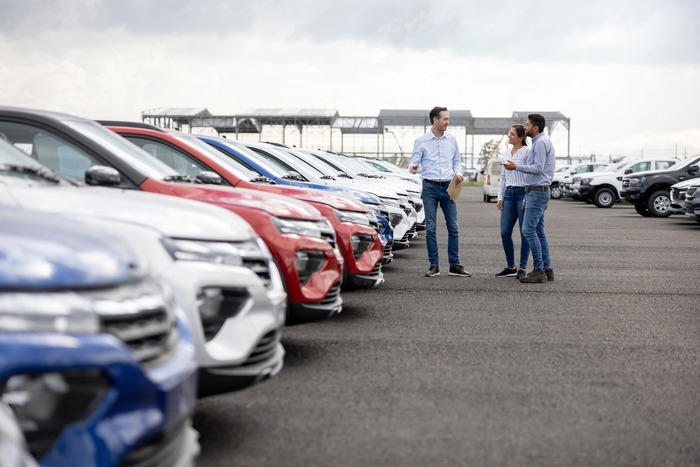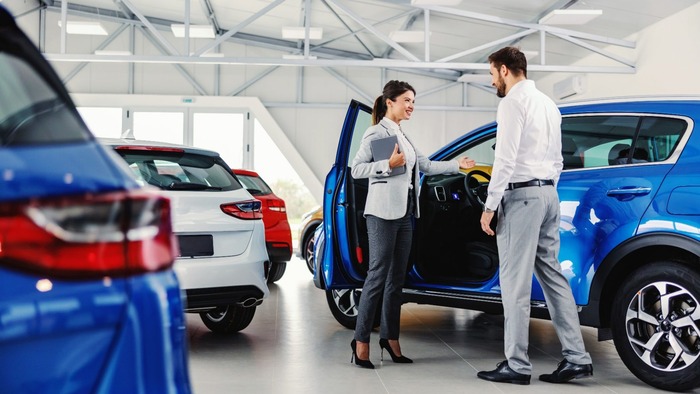It might be tempting to drop serious cash on brand-new wheels in 2025, but what if buying a used car is the best move this year? New cars can depreciate fast, up to 30% of their value within the first 2 years. In fact, CNBC states that used car sales are projected to increase by 1.2% in 2025.
Keep reading to learn more about how savvy buyers are avoiding dealership showrooms and visiting used car lots instead!
New Car Prices Keep Soaring
Have you checked out new car prices lately and needed to take a seat afterward? According to Kelley Blue Book, the average 2024 new car price was about $50,000–and 2025 will only see that figure rise. The primary reasons behind the increase are inflation and supply chain problems, making new vehicles that much more expensive to make.
With the economy on a seemingly never-ending rollercoaster ride, many consumers are turning to used cars instead, with some vehicles coming in at 40% to 50% less–and these vehicles may be just a few years old, not decades!
Buying used could help you avoid financial strain or even eliminate the need for emergency loans when unexpected expenses hit, leaving more money in your pocket for savings or other financial goals.
Do Used Cars Depreciate Faster?
Buying a new car can be exciting, but that feeling can quickly deflate when 10% of its value is lost within the first month of driving off the lot, and by the end of that first year, it could even be worth 20% less. It’s called depreciation, and if you want to sell the vehicle in five years or less, you’ll be looking at a significant financial loss due to it.
Depreciation is unavoidable, but choosing to buy a used car will allow you to:
- Dodge the biggest depreciation hit, especially if the model is currently popular on the market.
- Get more bang for your buck since you won’t pay the larger upfront costs of buying a new car, despite whatever incentives it may have.
- Possibly profit over the original purchase price if you are reselling, because many buyers look at the vehicle’s overall value, not flashy add-ons.
Given that buying a used car means the depreciation hit has already occurred, you’re still getting a vehicle that runs and handles smoothly without the “sticker shock” of the showroom tag–it’s a win-win.
Why There is a Strong Used Car Market in 2025?
2025 is going to see the price of used cars continue to decline, and buying used is also much safer and easier than ever due to improved car history reports, online marketplaces, and certified pre-owned (CPO) programs. Take a look at some of the changes:
- CPO Vehicles: Used cars can now come with manufacturer (or dealer) extended warranties, some potentially up to two years on top of the warranty initially given.
- Car History Reports: Consumers can use AutoCheck or Carfax to examine detailed accident history reports, ownership records, plus more–all from the convenience of their home.
- Various Online Options: As with most things in 2025, car buyers are going online instead of going to a dealership with Vroom and Carvana being a few of the most popular sites, making buying a car as convenient as buying socks off Amazon.
If you’re looking to buy a car in 2025, going used might be the way to go for you–and remember to look for reliability in a vehicle since if it’s over six years old, factory-covered warranties are less likely. But doing your homework couldn’t be easier with the online options we’ve covered, it’s just a few clicks away.
Do Used Cars Have Cheaper Insurance & Registration Fees?
Newer vehicles can tack on hundreds of dollars annually in insurance costs compared to used cars. Although there’s no “new” or “used” vehicle category with insurance companies, they do calculate the higher replacement costs and depreciation rates when offering your premium. Also, if a used car is in an accident, less would be paid out versus a new car.
When registering a car, depending on the state, fees are typically based on the vehicle’s age, weight, and estimated value.
Newer, pricier cars will most likely cost more to register than a used one. To legally drive anywhere in the U.S., you’ll need to register your car and have at least basic insurance coverage, and there are definite savings if your car is older.
Are Modern Cars Built to Last?
In the past, pushing over 200,000 miles meant your car was on borrowed time–but in 2025? It’s a different story with modern cars, and any model not driving smoothly over 100K has either never had an oil change or has been severely neglected.
With premium materials, engineering, and vastly improved maintenance technology, modern cars can easily last for over 200,000 miles (or more).
If you decide to buy a used car, if there are 100K-plus miles on the odometer, it no longer means you’re taking a risky financial gamble, it’s actually a smart move. Also, if the car is a relatively new model, the prior owner may have sold it to simply upgrade, so it’s probably in great condition.
Buying Used EVs & Hybrids in 2025
Electric and hybrid vehicles have surged in popularity, and not just with eco-conscious drivers, but a new model is far from cheap. However, the used EV and hybrid market is growing at a steady pace because more of these vehicles were manufactured than were initially purchased, and finding a reasonable price for one is much easier. EVs also have:
- Lower Depreciation: Unlike fossil fuel cars, EVs and hybrids generally drop in price much faster. You may be able to buy them for cheaper if they are used but keep in mind that the battery could be older and less efficient. If you have to replace the battery, you may not have a warranty to cover the total cost.
- Improved Batteries: New battery tech improvements mean longer life and better performance, and a used EV or hybrid vehicle in 2025 is safer now than ever.
- Charging Stations: With EV infrastructure growing, there’s been an expansion of charging stations at many more locations, making them much more practical.
Maybe you’ve been on the fence about going electric because of higher prices or “plugging in” your seems inconvenient, but buying a used EV or hybrid in 2025 makes more financial sense than it ever has before.
Get the Most Value for Your Money
You’ve budgeted, saved, and pinched pennies to come up with $25,000 to put down on a new car. “New” gets you a base model sedan with a glossy shine and a few other incentives–but going used, $25K can still get you a luxury vehicle with a sunroof and heated seats or an SUV with all the latest tech and safety features.
When you decide to go with a used vehicle, you’re getting the most for your money and driving away in a car that’s just as impressive as a new one but at a fraction of the sticker price. Getting from point A to B shouldn’t put you in a financial hole, which is why 2025 could be the year to buy used.
The Best Financial Move in 2025? Going Used!
Whether you’re in the market for a fuel-efficient hybrid or EV, luxury sedan, or reliable SUV, buying a used car is definitely the move in 2025, and probably the most sound financial decision for you.
Before signing on the dotted line, new or used, be sure to do your research first–check out market trends, shop around for the best deals, and negotiate for the price best for you.


